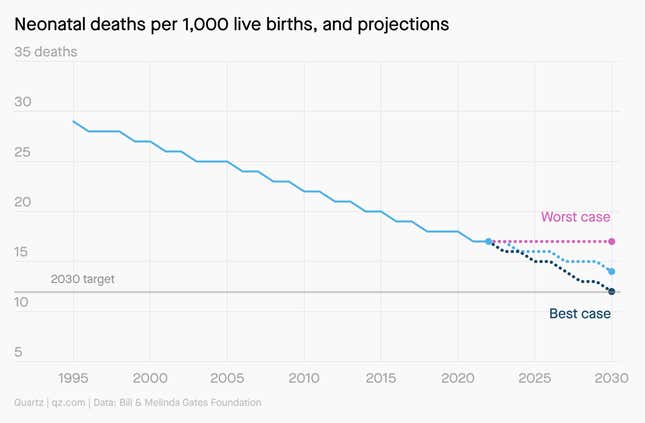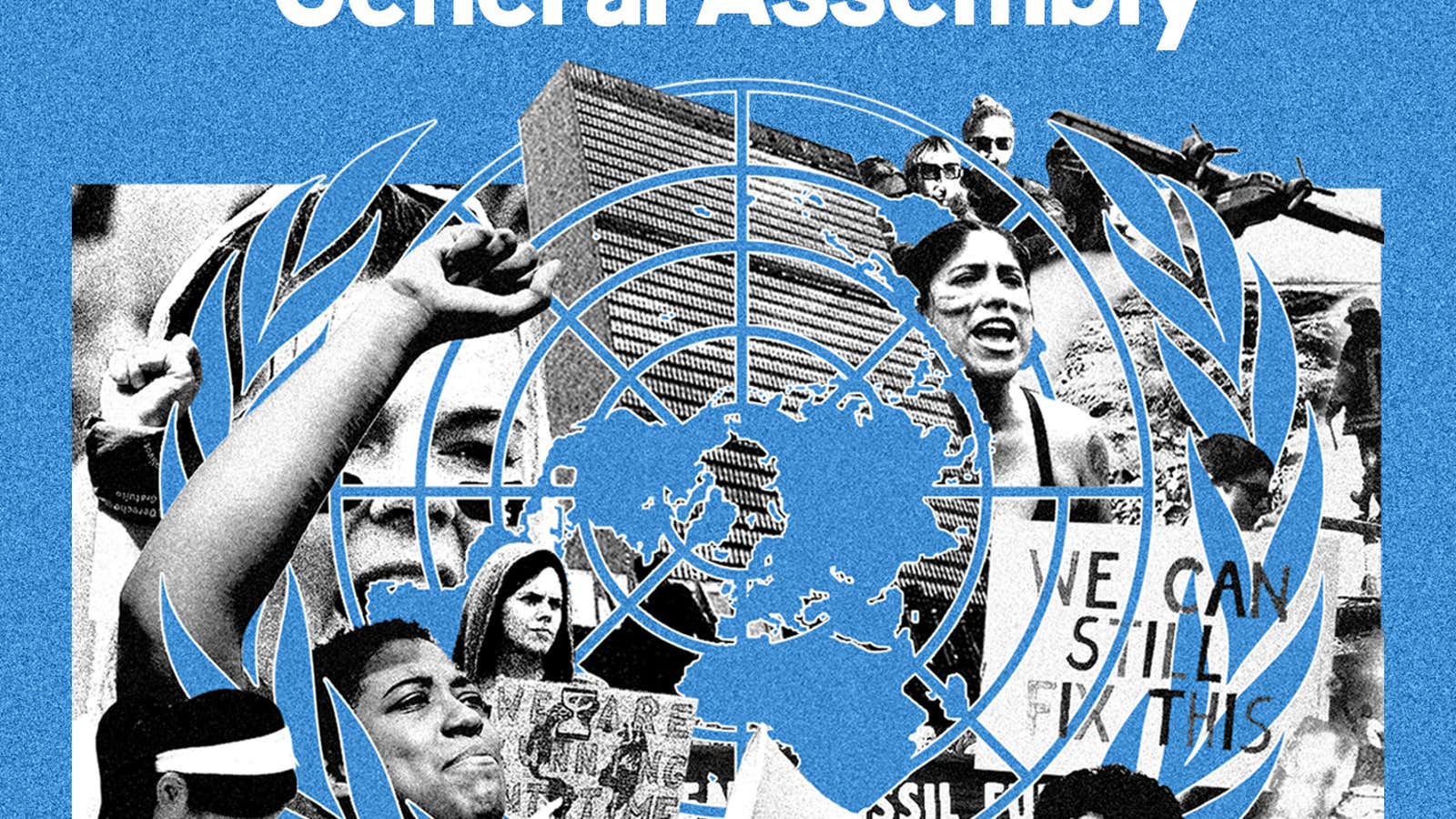Greetings, UN delegates and UNGA watchers!
As the United Nations General Assembly wraps up in New York, there’s been a most notable absence: covid. Masks were required upon entrance in the UN headquarters (though the mandate wasn’t necessarily widely respected), and the delegations had to reduce their size so as not to overcrowd the venues. But in the many high-profile meetings and side gatherings that filled up the year’s biggest development festival, covid was often dealt with in the past, as a challenge overcome that had caused important setbacks, but not as a main issue of current concern.
But while the new omicron-specific vaccine is administered in the global north—the fourth, or even fifth covid shot for many—only 16% of low-income county populations have completed the first round of immunization against the virus.
This is largely a consequence of vaccine inequality, and yet the subject was essentially absent from the agenda.
It’s fitting that the meetings happened in the US, where president Joe Biden declared the pandemic over even as the county continues to see more than 350 covid deaths a day. The absence of conversations about vaccine equality signals a collective “moving on” from covid that mirrors the way the pandemic was handled by the international community, focusing disproportionately on the reality in wealthy nations, and ignoring the situation elsewhere in the world.
With the exception of one event on equitable access to vaccines organized by the UN Secretary General last Friday afternoon (that is, at the very end of the UNGA week), the occasional mention of covid vaccine equality in the week’s events was usually due to outspoken participants such as World Health Organization (WHO) special envoy Ayoade Alakija, UNAIDS director Winnie Byanyima, or Maria Elena Bottazzi, the researcher who co-developed the low-cost, patent free covid vaccine Corbevax.
Plenty of panels discussed pandemic preparedness, or the need for African countries to make their own therapeutics and medications. One of the conference’s most-heard statistics was that less than 1% of Africa’s vaccines are locally made. But those conversations seemed premature, and rang a bit hollow as global powers have all but skipped ahead of the current crisis, without showing interest in filling the vaccination gap, nor in preparing the international cooperation field to make the next pandemic less unequal than the current one.
The $$$ commitments
The UN General Assembly meeting and its sideline events are conducive to dialogue, but also to fundraising. Here’s a brief sampling of the kind of money committed to global causes during this year’s gathering.
$295 million: Funding to support the development and adoption of inclusive digital public infrastructure, from the Bill & Melinda Gates Foundation ($200 million), Norway ($50 million), Germany ($35 million), and the EU Horn of Africa Initiative ($10 million).
$14.25 billion: Replenishment capital for the Global Fund to Fight AIDS, Tuberculosis and Malaria, which broke records despite falling short of the fund’s goal after the UK and Italy delayed their pledges. The biggest amounts came in from the US ($6 billion), France ($1.6 billion), Germany ($1.3 billion), and Japan ($1.1 billion); the donor list also included newcomers like Indonesia ($10 million) and Tanzania ($1 million).
€1.5 billion ($1.4 billion): The annual spending that Germany will put toward biodiversity conservation, the highest commitment to the cause among industrialized nations and an increase of €0.87 billion from the German government’s average funding from 2016 to 2020. “With this contribution, we want to send a strong signal for an ambitious outcome” of the UN Biodiversity Conference in December, German chancellor Olaf Scholz said.
144: Commitments announced by various organizations and institutions on stage at the Clinton Global Initiative. Ranging from LeapFrog Investments’ support of 25 micro and small enterprises across Africa to Rainforest Alliance’s $15,000 in community forest management.
22,725: That’s how many refugees major American employers agreed to place in full-time jobs in the US. The pledges were led by Amazon (5,000 refugees to be hired over the next three years), ManpowerGroup (3,000 hires), Tyson Foods (2,500), and Blackstone (2,000 at the private equity firm’s portfolio companies and properties). The commitments were announced at a summit organized by Chobani CEO Hamdi Ulukaya’s nonprofit Tent Partnership for Refugees.
Quoted
“It’s no longer just Greta out there.”— Martina Donlon, UN senior public information officer, notes the rise of youth climate activists from the global south, on a panel about storytelling for climate awareness and action.
News from elsewhere
The Bank of England refused to prop the pound up. The British currency plunged 5% against the dollar, to a record low, as the government announced the biggest tax cuts in 50 years.
The EU will delay its plan to cap Russian oil prices. Internal disagreement, including dissent from Hungary and Cyprus, is stalling action. Meanwhile, the defunct Nord Stream 2 pipeline has sprung a leak.
The OECD slashed its 2023 growth forecast. Russia’s invasion of Ukraine will cost the global economy an estimated $2.8 trillion, according to the organization.
Japanese prime minister Fumio Kishida met with US vice president Kamala Harris. The two are in Tokyo to discuss the issue of Taiwan’s security as protests over former prime minister Shinzo Abe’s funeral continue.
Whistleblower Edward Snowden is now a dual US-Russian citizen. The ex-NSA employee has lived in Moscow since fleeing the US after exposing a government mass surveillance program in 2013.
Cubans boosted LGBTQ rights. A referendum approved a new family law that allows same-sex couples to marry and adopt, and also strengthens gender equality.
GOOOOOOALLLLLLLLL
Over the course of this pop-up email, we’ve looked at a number of the 17 Sustainable Development Goals—the series of ambitious targets decided on by UN member nations and meant to reduce poverty, fight inequality, and halt climate change by 2030.
The world isn’t really on track to meet any of them, but there are at least some subgoals that show promise. Goal No. 3 aims to “ensure healthy lives and promote well-being for all ages.” A couple of the category’s subgoals relate to child mortality and, thankfully, they appear to be on track.
In a likely best case scenario, the world should be able to reduce neonatal mortality to at least as low as 12 per 1,000 live births by 2030.

Additionally, if the current rate of progress continues, the world should also reduce preventable deaths of children under age 5 to 25 per 1,000 births. Unfortunately, though, a number of the other subgoals are far from on track, including ending the AIDS epidemic, tuberculosis, and malaria.
We’re nearly at the end! Stay tuned for our UNGA 2022 recap email, coming to your inbox tomorrow.
Sad it’s all winding down? We are, too. So we’ve already planned a reunion! At our Gauging the Goals event on Oct. 6, Quartz and the Gates Foundation will look back and unpack what we learned at UNGA. We invite you to register today and look forward to seeing you then.
—Heather Landy, executive editor; Annalisa Merelli, senior reporter; Amanda Shendruk, things reporter; Alexander Onukwue, West Africa correspondent; and Morgan Haefner, deputy email editor
